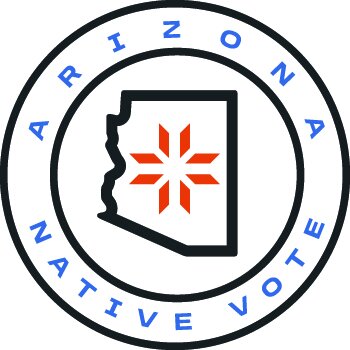Cody’s Story: The First Time You Vote Feels Big—Because It Is
For Cody Elliott, a psychology student at Diné College and a former Arizona Native Vote fellow, turning 18 didn’t just mean becoming an adult—it meant being handed a new set of responsibilities. From registering for Selective Service to signing up with his chapter, Cody knew that civic engagement was part of adulthood. But like many Native youth, voting felt more like a task than a meaningful act—until he began learning what it actually meant.
When he got to college, he registered to vote during a career fair where the Navajo Nation had a booth. It was a quick process—he filled out a form, provided his census number, and got a voter card. “[Registering] wasn’t hard, but no one really explained what came next,” he said. So, when Cody filled out his first ballot, it felt overwhelming. “There was a lot of information. I mostly voted for the people I saw out in public or at community events. I didn’t really know who most of them were or what they stood for.”
What He Wishes He Knew at 18
If he could go back and give his 18-year-old self advice, it would be simple but powerful: “Learn more about voting education and civic engagement. Understand how it works, and how you can make an impact.” Cody didn’t grow up hearing much about voting. No one really explained how it worked—or why it mattered. “I think it was because of a lack of education on it. The only thing people talked about was the presidential election—not local or state ones like Apache County.” Cody believes that lack of knowledge—not apathy—is what keeps Native youth from voting.
“We need to be shown how the process works. What the ballot means. What happens if we do vote—and what happens if we don’t.” He says if young people were given clearer education and opportunities to engage, they’d feel more confident and connected. “Give them events. Give them real conversations. Show them how their values can show up on a ballot.”
Voting Isn’t Just a Task—It’s a Tool
Although Cody hasn’t yet seen a direct result from his vote, he knows the impact is there. “It’s a tool. It gives you a place to input what you believe in. A chance to move your community forward.” For him, upcoming elections are a chance to be more prepared—by researching candidates, understanding propositions, and thinking critically about how each vote affects Native communities. “I want to know what someone will actually work on if they’re in office—not just what party they’re with.”
From Passive to Powerful
Like many youth, Cody didn’t have someone walk him through the process—but he believes organizations like Arizona Native Vote can fill that gap. “Civic engagement events really help. Even something like a career day, where you can talk about voting and what it means to participate—it makes a difference.” His journey from passive voter to active participant mirrors what Arizona Native Vote is all about: Native youth realizing the power they already hold, and learning how to use it. “Voting gives Native youth the opportunity to put forward what they believe in—what they value.” he says.


